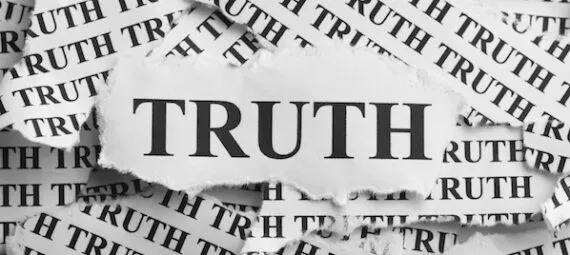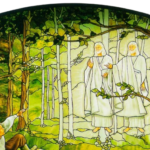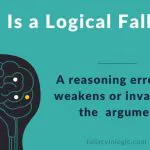Recently John Dehlin claimed religion had two “secret ingredients” that keep people tied to religion. These traits, according to Dehlin, are
- Guilt/Shame
- Absolute Truth
He claimed that healthy secular communities don’t have these traits, making them better. I found this claim very odd and perplexing. Do healthy communities use guilt and shame? Do they ascribe to absolute truths? Of course, they do.
Guilt and Shame
No society on earth is without norms and values i.e. what is acceptable and not acceptable. When a norm is broken the response is always some sort of shame and guilt. This is the natural human response. Guilt is a universal human emotion that occurs when our conduct is not in line with standards of conduct or has violated universal moral standards. Therefore, as human beings and societies, we experience guilt when our actions do not meet the societal and personal standards set forth. Societies from the dawn of time have used guilt/shame to varying degrees to control societal mores. Shame is used when we want to dissuade people from an act that society believes is wrong.
John Dehlin even uses guilt and shame as a means of persuasion. He has many times called the acts of the LDS church shameful and its top leadership dishonest and accused the church of hiding history. These are acts of shaming. He is trying to persuade people to engage in activity that he believes is wrong. He is making an example out of them for his belief that they are outside of his mores and values.
Absolute Truth
What does absolute truth mean? Some define absolute truth as a statement that is true at all times and in all places. It is always true no matter what the circumstances. It is a fact that cannot be changed. For example, there are no round squares. Another accepted definition is “conformity to fact or actuality; a statement proven to be or accepted as true.” In this sense, truth is more of an axiom. It’s a complicated topic that has been debated by philosophers for thousands of years. It’s an interesting topic and a fundamental one for our existence and understanding. Some claim that there are no absolute truths and everything is relative. However, this is incorrect. All human beings believe in some sort of absolute truth. The term absolute truth logically implies an absolute truth of some sort. Let look at an example.
Suppose I claim that “absolute truth exists” and someone else comes and claims “absolute truth does not exist.” Both have made an absolute truth claim. The second claim is illogical due to the fact that the second person has claimed an absolute truth while claiming there is not absolute truth. Therefore, logically there must be absolute truth of some sort. If this is true logically then what claims can be considered absolute from a secular point of view?
- There is an existence and we exist along with other existent beings
- Humans act
- We can learn and progress
- Concepts are discoverable
- There are elements in motion
These are just a few absolute truths that we accept as humans regardless of religion or ideology. These truths dictate our existence and the actions we take. They form the basis of our understanding.
Therefore, Dehlin’s claim that societies don’t use absolute truth is false. They do. This is precisely why he qualified his statement by stating that “healthy” secular communities don’t have absolute truth. What he is specifically contrasting is religious belief with secular belief. He is making the claim that religion is bad due to the belief in a certain truth proposed by religion. His attempt is to discredit religion. Although Dehlin’s argument is aimed at religion in general I will be showing the faults of this argument from an LDS perspective and tradition.
Finding truth from the truth we already know
Because we all believe that there is an existence, that elements are in motion, and that concepts are discoverable we must inevitably believe there is a means to determine truth i.e what is real. For secular societies this method is the scientific method and deduction that is derived from the method. This method is defined by the following steps.
- Make an observation.
- Ask a question.
- Form a hypothesis, or testable explanation.
- Make a prediction based on the hypothesis.
- Test the prediction.
- Iterate: use the results to make new hypotheses or predictions.
This method is based on our senses and their ability to report phenomena that we observe.
Religion offers the same method.
When Joseph Smith was faced with a question about which religion was correct, he followed the steps to come to a conclusion
- He observed the teachings of the churches around him (Joseph Smith History 1:6)
- He wanted to know what church was correct (Joseph Smith History 1:10)
- He formed a hypothesis on how he would receive an answer(Joseph Smith History 1:12-13)
- He predicted that God would answer him(Joseph Smith History 1:13)
- He tested the hypothesis (Joseph Smith History 1:14-19)
- He used the results to conclude (Joseph Smith History 1:20)
The same process was used by Joseph Smith as many other notable discoveries in the history of the world. Therefore, the same absolute truth and methods are used by the LDS faith as are used by secular communities.
Is absolute truth in LDS tradition different than in secular communities?
The answer to this question is no, they can change. I speak specifically of the LDS tradition in which most of John Dehlin’s efforts are aimed.
Joseph Smith, in 1842, wrote the Articles of Faith to a reporter from Chicago that outlined thirteen core beliefs of the religion. The ninth article states
We believe all that God has revealed, all that He does now reveal, and we believe that He will yet reveal many great and important things pertaining to the Kingdom of God.
Article of Faith #9
This statement makes it very clear that revelation is a core tenant of the LDS faith. We believe in continuing revelation. This means that things can change according to Divine will and that those changes will be revealed. But how can we know if it is true?
If any of you lack wisdom, let him ask of God, that giveth to all men liberally, and upbraideth not; and it shall be given him.
James 1:5
Therefore we believe in not only change but also in a mechanism that allows for the discovery of truth. We don’t believe in blind faith in a tradition or man but in a process that allows us to discover new concepts and understanding. The only difference is that John Dehlin disagrees with the result but the method is the same and the underlying axioms are the exact same between secular societies and the LDS tradition.





